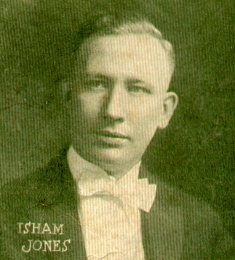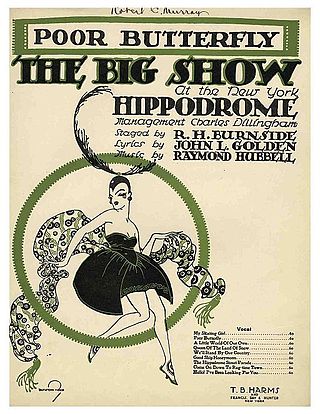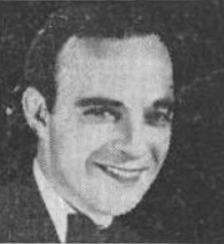
Isham Edgar Jones was an American bandleader, saxophonist, bassist and songwriter.
"How High the Moon" is a jazz standard with lyrics by Nancy Hamilton and music by Morgan Lewis. It was first featured in the 1940 Broadway revue Two for the Show, where it was sung by Alfred Drake and Frances Comstock. In Two for the Show, this was a rare serious moment in an otherwise humorous revue.
"Wheel of Fortune" is a popular song written by Bennie Benjamin and George David Weiss and published in 1951. It is best remembered in the 1952 hit version by Kay Starr.
"Blue Room" is a show tune from the 1926 Rodgers and Hart musical The Girl Friend, where it was introduced by Eva Puck and Sammy White. It is also a jazz standard.
"Confess" is a popular song written by Bennie Benjamin and George David Weiss.
"Love Me or Leave Me" is a popular song written in 1928 by Walter Donaldson with lyrics by Gus Kahn. The song was introduced in the Broadway musical comedy Whoopee!, which opened in December 1928. Ruth Etting's performance of the song was so popular that she was also given the song to sing in the play Simple Simon, which opened in February 1930.

"Side by Side" is a popular song by Harry M. Woods written in 1927, and is now considered a standard.
"The One I Love (Belongs to Somebody Else)" is a popular song composed by Isham Jones with lyrics by Gus Kahn. The song was recorded by Isham Jones' Orchestra on December 21, 1923, at Brunswick Studios in New York City, and published on January 7, 1924. On January 17 in Chicago, Jones recorded another version, with Al Jolson on lead vocals. Both versions made the charts that Spring, with Jolson's peaking at number 2, and Jones' at number 5. Sophie Tucker recorded her version February 1924, released on Okeh 40054.
"Sometimes I'm Happy" is a popular song. The music was written by Vincent Youmans, the lyrics by Irving Caesar. The song was originally published in 1923 under the title "Come On And Pet Me," with lyrics by Oscar Hammerstein II and William Cary Duncan.

"I Can't Give You Anything but Love, Baby" is an American popular song and jazz standard by Jimmy McHugh (music) and Dorothy Fields (lyrics). The song was introduced by Adelaide Hall at Les Ambassadeurs Club in New York in January 1928 in Lew Leslie's Blackbird Revue, which opened on Broadway later that year as the highly successful Blackbirds of 1928, wherein it was performed by Adelaide Hall, Aida Ward, and Willard McLean.

"I Found a Million Dollar Baby (in a Five and Ten Cent Store)" is a popular song.
"Love Walked In" is a song composed by George Gershwin, with lyrics by Ira Gershwin. The tune was composed in 1930, but the lyric was not written until 1937, for the movie musical The Goldwyn Follies (1938), where it was sung by Kenny Baker. Hit versions include Sammy Kaye (1938), The Hilltoppers (1953), Ella Fitzgerald (1959), The Flamingos (1959) and Dinah Washington (1960). Artie Shaw recorded the song in the early 1940s.
"More Than You Know" is a popular song, composed by Vincent Youmans with lyrics by Billy Rose and Edward Eliscu. The song was published in 1929.
"That's My Desire" is a 1931 popular song with music by Helmy Kresa and lyrics by Carroll Loveday.
"I Don't Know Why (I Just Do)" is a 1931 popular song.

"Poor Butterfly" is a popular song. It was inspired by Giacomo Puccini's opera Madame Butterfly and contains a brief musical quote from the Act two duet Tutti i fior in the verse.

"I'm Always Chasing Rainbows" is a popular Vaudeville song. The music is credited to Harry Carroll, but the melody is adapted from Fantaisie-Impromptu by Frédéric Chopin. The lyrics were written by Joseph McCarthy, and the song was published in 1917. It was introduced in the Broadway show Oh, Look! which opened in March 1918. The song was sung in the show by the Dolly Sisters. Judy Garland sang it in the 1941 film Ziegfeld Girl. It was subsequently sung by Jack Oakie in the 1944 film The Merry Monahans and was again featured in the 1945 film The Dolly Sisters, where it was sung by John Payne. It was also included for part of the run of the 1973 revival of Irene.

"Darktown Strutters' Ball" is a popular song by Shelton Brooks, published in 1917. The song has been recorded many times and is considered a popular and jazz standard. There are many variations of the title, including "At the Darktown Strutters' Ball", "The Darktown Strutters' Ball", and just "Strutters' Ball".
"Let's Put Out the Lights " is a popular song by Herman Hupfeld, published in 1932. It was introduced by Lili Damita in the Broadway revue George White's Music Hall Varieties (1932) with the initial title "(Let's) Turn Out the Lights and Go to Bed", and hit versions that year were by Rudy Vallée, Paul Whiteman and Ben Bernie.

Dick Robertson was an American popular big band singer and songwriter of the 1930s and 1940s. He sang for many bandleaders such as Leo Reisman and Roger Wolfe Kahn and His Orchestra, and was on the artist roster at Banner Records. In fact, he was one of the most prolific New York based vocalists on scores of records from late 1928 through the mid 1930s. A series of records issued on Melotone/Perfect/Banner/Oriole/Romeo, Crown, Bluebird from 1930-1934 were issued under his name or are listed in the 2010 edition of "American Dance Bands on Record and Film (1915-1942)" by Richard J. Johnson and Bernard H. Shirley as being under his nominal leadership. His last recording session as a singer was in 1949. He also used the pseudonym Bob Richardson for some recordings on Mayfair Records.







